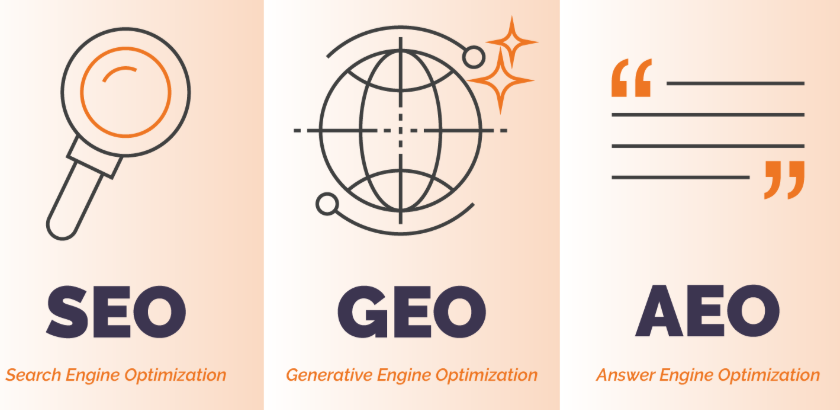As search experiences evolve from traditional keyword searches to conversational and AI-generated answers, the strategies behind content visibility are also changing. Today, three core optimization concepts are shaping the future of online discovery: SEO (Search Engine Optimization), AEO (Answer Engine Optimization), and GEO (Generative Engine Optimization). Understanding the differences—and how they work together—is the key to staying discoverable in a world shifting from “search” to “answers”.
What Is SEO? (Search Engine Optimization)
SEO is the practice of improving a website’s visibility on traditional search engines like Google and Bing. The goal is to rank higher in search results to attract organic traffic.
Key Focus Areas of SEO
| Area | Description |
|---|---|
| Keywords | Optimize pages to match user search queries |
| On-page Content | High-quality content that satisfies search intent |
| Technical Optimization | Speed, mobile performance, structured data, indexability |
| Backlinks | Building authority and trust signals |
Goal: Increase your ranking and clicks from the search results page.
SEO is still essential—it forms the foundational visibility layer that all modern optimization builds upon.
What Is AEO? (Answer Engine Optimization)
With the rise of tools like Google Featured Snippets, Siri, Alexa, and ChatGPT as a search replacement, users often want direct answers rather than long result lists.
AEO focuses on structuring content so that AI-powered answer engines can easily understand and directly extract answers.
Key Features of AEO
| Focus | Explanation |
|---|---|
| Clear, concise answers | Content should directly respond to specific user questions |
| Structured formatting | Use headings, Q&A blocks, bullet points, tables |
| Schema / Structured Data | Help machines understand context and meaning |
| Expertise & accuracy | Provide authoritative, verifiable insights |
Goal: Become the answer, not just a link.
What Is GEO? (Generative Engine Optimization)
GEO targets how AI models (like ChatGPT, Perplexity, Gemini, and Claude) surface, quote, summarize, or reference your content during generative responses.
Unlike search engines, AI models do not “rank” websites—they interpret patterns across knowledge sources.
Therefore, GEO focuses on making your content AI-ready and machine-comprehensible.
Key Components of GEO
| Area | Description |
|---|---|
| Trusted Data Signals | Use authoritative sources, studies, citations |
| Consistent Framing | Clear topic focus helps LLMs associate your content with expertise areas |
| Multi-format Content | Include: text articles, Q&A summaries, graphs, checklists, PDFs, public data |
| Brand / Entity Presence | Strengthen your brand as a known author or expert online |
Goal: Be the information AI chooses to reference or summarize.
Which One Should You Focus On?
| Strategy | Purpose | When to Focus |
|---|---|---|
| SEO | Rank higher in traditional search | Always—the foundation of visibility |
| AEO | Become the direct answer for “question-style queries” | When users search with questions |
| GEO | Be referenced by AI chatbots and generative platforms | If your audience is shifting to AI assistants |
In 2025 and beyond, the most effective strategy is a combination of all three.
How to Implement SEO + AEO + GEO Together (Practical Framework)
1. Start with SEO Foundation
-
Ensure fast site performance
-
Optimize internal links and navigation
-
Write high-quality, search-intent-driven content
2. Add AEO-Style Answer Formatting
-
Use FAQ sections with clear Q&A blocks
-
Start each section by answering the question in one sentence
-
Add tables, bullet points, and structured summaries
3. Optimize for Generative Models (GEO)
-
Publish authoritative insights, case studies, real processes—not only marketing copy
-
Use consistent terminology so AI can associate your brand with specific expertise
-
Expand presence across platforms AI pulls from (e.g., Wikipedia, forums, research repositories, LinkedIn articles, publications)
Why These Optimizations Matter Now
Search behavior is shifting:
-
Users no longer browse through pages—they want instant answers
-
AI assistants are replacing traditional search engines
-
Brands that do not adapt will lose visibility, trust, and traffic
By combining SEO + AEO + GEO, you ensure:
✔ You can be found
✔ You can be selected as the answer
✔ You can be referenced by generative AI models
This is how brands stay visible, authoritative, and competitive in the new era of search.








